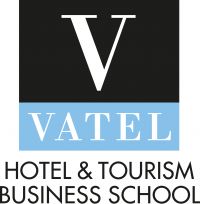
INTERVIEW - KARINE SEBBAN-BENZAZON, PRESIDENT OF THE VATEL GROUP: "FAVOUR INTERNSHIPS IN LUXURY HOTELS"
The new president has taken up the torch of a family adventure begun by her father, Alain Sebban, in 1981, and intends to continue the international transmission of French-style hospitality |
 |
INTERVIEW - KARINE SEBBAN-BENZAZON, PRESIDENT OF THE VATEL GROUP: "FAVOUR INTERNSHIPS IN LUXURY HOTELS"
The new president has taken up the torch of a family adventure begun by her father, Alain Sebban, in 1981, and intends to continue the international transmission of French-style hospitality |
Category: Worldwide - Careers
- Interviews and portraits
- Career - Interviews
Interview made by Vanessa Guerrier-Buisine on 2023-12-06
 Karine Sebban Benzazon, president of Vatel group
Photo credit © F Marechal FF 2016/ Groupe VATEL
In 2007, she took over from her mother in Lyon and was appointed Managing Director of the Vatel Lyon school, while continuing to manage the Nîmes school. In 2018, she took on a new challenge: the creation and management of Vatel Nantes. At the same time, she took on greater responsibility alongside her father to roll out the group's strategy in France and internationally. Karine Sebban-Benzazon was brought up in her father's school of strategy and business development, as she imbibed her mother's teaching methods. It was therefore only natural that, in 2023, her father should entrust her with the management of the group he had founded and run for over 30 years.
The President of the Vatel group talks to the Journal des Palaces about what constitutes the DNA of this international hotel and tourism management education group, and about its future.Journal des Palaces: You have just been appointed President of the group, taking over from your father. How do you feel about the trust your father has placed in you and the new responsibilities you are taking on?Karine Sebban-Benzazon : A feeling of pride… For 24 years, I worked very closely with the teachers and students in the Vatel schools that I managed. In a way, my parents applied the Vatel teaching concept with me: at their side, I worked on theory and in the 3 schools, I was confronted with experimentation.
Things took shape over time. However, my parents had decided about five years ago that I would take over the presidency of the group when my father retired. It was a very natural assumption of responsibility.What challenges and objectives do you now face as President of the group?Today Vatel has 55 schools, so the first challenge is to maintain the quality of all the schools so that we can continue to improve the training of the students who will be tomorrow's managers in the hotel industry. So the main challenge is to maintain a high standard of training for students, and to ensure that training courses evolve in line with needs.
Then there's the development part, which takes place as we meet new people and meet new needs. Over the last few years, we've done a lot of development in Africa, and that meets a need. Partners come to us with the aim of training young people in their countries so that they can then develop tourism there too. And to achieve that, they need qualified staff.
Rather than inviting young international students to study in France, thousands of miles away from their families, some twenty years ago we decided to train 18-year-olds in their countries. It was with this in mind that we opened our first international schools in Tunis, Bangkok and elsewhere.
We have continued to expand internationally, not for the sake of financial growth, but with the aim of passing on the values of French hospitality, which are internationally recognised as among the best.What are Vatel's strengths, and why do students choose you?I think that what first encourages young people to come to us today is certainly the international dimension. This is achieved through internships abroad in the second year, but also through the Marco Polo programme that we have set up. This is an exchange programme between Vatel schools that can be done in the second or third year in one of the groups schools.
But this is not a travel programme, it's a real study programme, as the 55 schools in the group follow the same training programmes. All the Vatel schools in the world have the same syllabus in marketing, management, human resources, etc., their students wear the same uniform, and they teach French as a foreign language. And I intend to continue along these lines.Your arrival in Cannes has been very well received. Could you outline the project?It's a major project that we're currently working on. We've got a lot of support from the local authorities, and that's certainly going to be part of the success of this project.
This project is based on a simple observation: there is currently a massive shortage of technical staff in the hospitality industry. For 40 years, this has been the basis of my parents' work, when they decided to create the Vatel schools, with a very close relationship with the profession, training young people according to the needs of the profession.
Until then, we were training managers, but today there is a real problem with the technical side, which is why we decided to open schools to train young people in the technical professions of catering and hospitality. All these jobs are somewhat technical, so they are more geared towards young people aged 15 or 16 after secondary school, but also towards adults undergoing professional retraining.Is this how the Campus Academy model came about?We wanted another name to make our offering clearer. The Business School trains managers after the baccalaureate, and the Academy trains young and not-so-young people in technical professions.
The Vatel Academy is therefore a school, with classrooms, but above all with an application restaurant, demonstration kitchens, a pastry laboratory, a hotel and its reception. All these facilities are there to teach young people all these technical skills.
We aim to offer these apprenticeships so that the young people can be in the professional world as quickly as possible so that they can be supported by us in all aspects of teaching and technical apprenticeship. But also so that they can help professionals as quickly as possible and be trained in the professional world.
Cannes will be an Academy, and Lille and Dijon are well advanced.How do you prepare future managers?Our students have a large part of their teaching in HR. But it's during their work experience, in our restaurants, in the kitchen, in the hotels, and during placements that they discover management.
We advise them to keep their ears and eyes wide open during these placements because they will be meeting managers and seeing good and not-so-good practices. They will be learning about what they will be tomorrow. The 6-month international placement is also fascinating in this respect, to see the differences between a manager in Asia, the United States or Northern Europe.Could you cite a few concrete solutions to the crisis in recruitment?As far as management professions are concerned, we haven't seen a crisis in recruitment. On the other hand, as I said earlier, we are seeing a crisis in technical occupations. It's up to us, as hospitality and tourism professionals and trainers, to make people want to return to these professions.
It's up to us to show them that they are a source of satisfaction and fulfilment. Some hotel properties have already realised this, and are putting in place practical solutions such as eliminating breaks, offering better pay, providing ongoing training, etc.What do you see as the next developments in terms of training?Our teaching concept, combining theory and experimentation, has remained the same for over 40 years. But we are always very vigilant in maintaining the interest of our students. Over the last ten years, for example, revenue management has become a new subject, as has everything to do with ESG and community management.
There's no doubt that in the upcoming years, the revolution will be in digital technology and artificial intelligence. These are new tools that will free teachers and students from repetitive and uninteresting tasks, allowing them to devote themselves fully to thinking about the hospitality professions of the future.
It will undoubtedly be an exciting time, but the human element is so important in these professions that the human element will remain at the centre of everything.What advice would you give to a young person wanting to make a career in the luxury hospitality industry?Firstly, I would say that luxury hospitality is an extremely formative environment. All the codes of hospitality are pushed to the extreme. Many of our Vatéliens who have set up their businesses came through the luxury hospitality industry. Take Isabelle Boutteville, for example, who worked at the Savoy-Christmas and then the Four Seasons Georges V before founding her consultancy Excel Place, a benchmark in customer experience and quality.
I'm also thinking of Hervé de Gouvion Saint-Cyr, who, before setting up TalentriCity-Architecte d'Expériences, was Deputy Sales Director of the Plaza Athénée and General Manager of Luxury Attitude.
And if I had to give one piece of advice to a young person wanting to enter the luxury hospitality industry, I'd tell them to give priority to internships in luxury hotels, to practise in different positions to get to know all the workings of these institutions that are the pride of the hospitality industry.
 Wherever the school is located, the teaching is the same, and so is the uniform
Photo credit © Groupe VATEL
|
|








